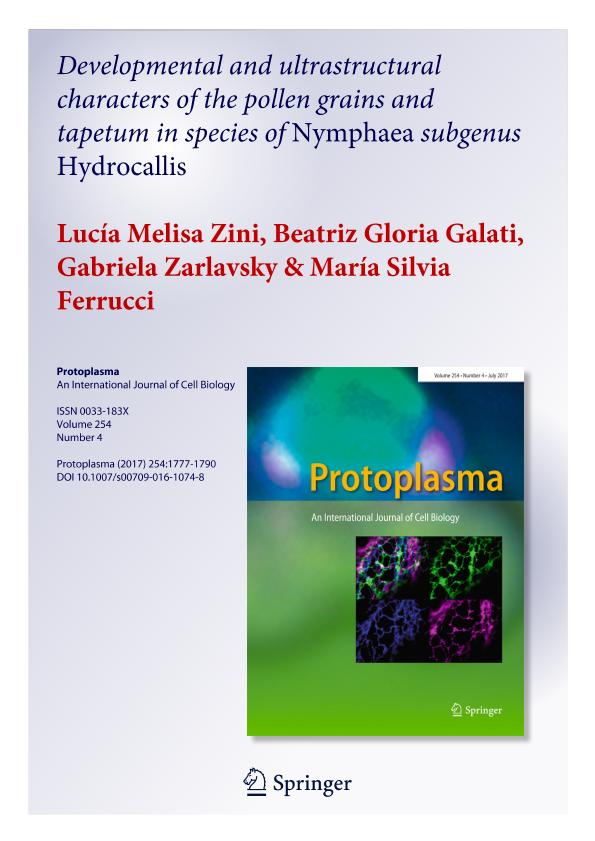Mostrar el registro sencillo del ítem
dc.contributor.author
Zini, Lucia Melisa

dc.contributor.author
Galati, Beatriz Gloria

dc.contributor.author
Zarlavsky, Gabriela Elena

dc.contributor.author
Ferrucci, María Silvia

dc.date.available
2019-09-02T17:45:45Z
dc.date.issued
2017-07
dc.identifier.citation
Zini, Lucia Melisa; Galati, Beatriz Gloria; Zarlavsky, Gabriela Elena; Ferrucci, María Silvia; Developmental and ultrastructural characters of the pollen grains and tapetum in species of Nymphaea subgenus Hydrocallis; Springer Wien; Protoplasma; 254; 4; 7-2017; 1777-1790
dc.identifier.issn
0033-183X
dc.identifier.uri
http://hdl.handle.net/11336/82722
dc.description.abstract
Variations in pollen characters and tapetum behavior were recently acknowledged in the early-divergent family Nymphaeaceae and even within the genus Nymphaea, which probably is not monophyletic; some traits such as infratectum and tapetum type are also a matter of different interpretations. In this study, developmental characters of the pollen grains and tapetum in Nymphaea subgenus Hydrocallis are provided for the first time. Observations were made in N. amazonum, N. gardneriana, and N. prolifera using light, scanning, and transmission electron microscopy. Tapetum is of the secretory type and produces orbicules. At microspore and pollen grain stages, the distal and proximal walls differ considerably. This result supports the operculate condition of the aperture in Hydrocallis, and such aperture might be plesiomorphic for Nymphaeoideae. The infratectum is intermediate, composed of inter-columellae granular elements, robust columellae consisting of agglomerated granules, complete columellae, and fused columellae. Narrow microchannels are present and persist until the mature pollen grain stage. The membranous granular layer is often present in the pollen grains of Nymphaeaceae. In N. gardneriana, this layer is most probably a component of the intine because it is lost after acetolysis. Orbicules in the Nymphaeaceae are characterized as spherical or subspherical, with a smooth sporopolleninic wall that surrounds an electron-lucent core and with individual orbicules that usually merge to give irregular aggregations. The aperture, pollen wall ultrastructure, and the tapetum of the studied species are discussed in an evolutionary and systematic context, and these characters are also compared with those of other angiosperm lineages.
dc.format
application/pdf
dc.language.iso
eng
dc.publisher
Springer Wien

dc.rights
info:eu-repo/semantics/openAccess
dc.rights.uri
https://creativecommons.org/licenses/by-nc-sa/2.5/ar/
dc.subject
Exine
dc.subject
Membranous Granular Layer
dc.subject
Orbicules
dc.subject
Pollen
dc.subject
Tapetum Type
dc.subject.classification
Ciencias de las Plantas, Botánica

dc.subject.classification
Ciencias Biológicas

dc.subject.classification
CIENCIAS NATURALES Y EXACTAS

dc.title
Developmental and ultrastructural characters of the pollen grains and tapetum in species of Nymphaea subgenus Hydrocallis
dc.type
info:eu-repo/semantics/article
dc.type
info:ar-repo/semantics/artículo
dc.type
info:eu-repo/semantics/publishedVersion
dc.date.updated
2019-08-20T14:08:27Z
dc.journal.volume
254
dc.journal.number
4
dc.journal.pagination
1777-1790
dc.journal.pais
Austria

dc.journal.ciudad
Viena
dc.description.fil
Fil: Zini, Lucia Melisa. Consejo Nacional de Investigaciones Científicas y Técnicas. Centro Científico Tecnológico Conicet - Nordeste. Instituto de Botánica del Nordeste. Universidad Nacional del Nordeste. Facultad de Ciencias Agrarias. Instituto de Botánica del Nordeste; Argentina
dc.description.fil
Fil: Galati, Beatriz Gloria. Universidad de Buenos Aires. Facultad de Agronomía. Departamento de Recursos Naturales y Ambiente. Cátedra de Botánica Agrícola; Argentina
dc.description.fil
Fil: Zarlavsky, Gabriela Elena. Universidad de Buenos Aires. Facultad de Agronomía. Departamento de Recursos Naturales y Ambiente. Cátedra de Botánica Agrícola; Argentina
dc.description.fil
Fil: Ferrucci, María Silvia. Consejo Nacional de Investigaciones Científicas y Técnicas. Centro Científico Tecnológico Conicet - Nordeste. Instituto de Botánica del Nordeste. Universidad Nacional del Nordeste. Facultad de Ciencias Agrarias. Instituto de Botánica del Nordeste; Argentina
dc.journal.title
Protoplasma

dc.relation.alternativeid
info:eu-repo/semantics/altIdentifier/doi/http://dx.doi.org/10.1007/s00709-016-1074-8
dc.relation.alternativeid
info:eu-repo/semantics/altIdentifier/url/https://link.springer.com/article/10.1007%2Fs00709-016-1074-8
Archivos asociados
